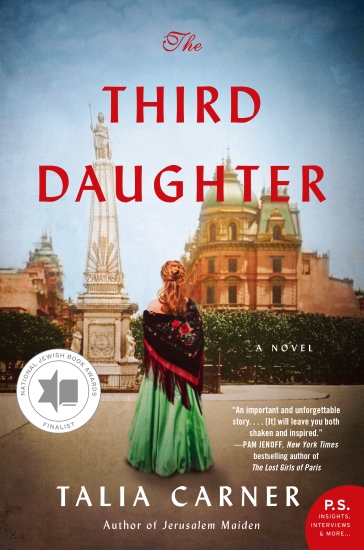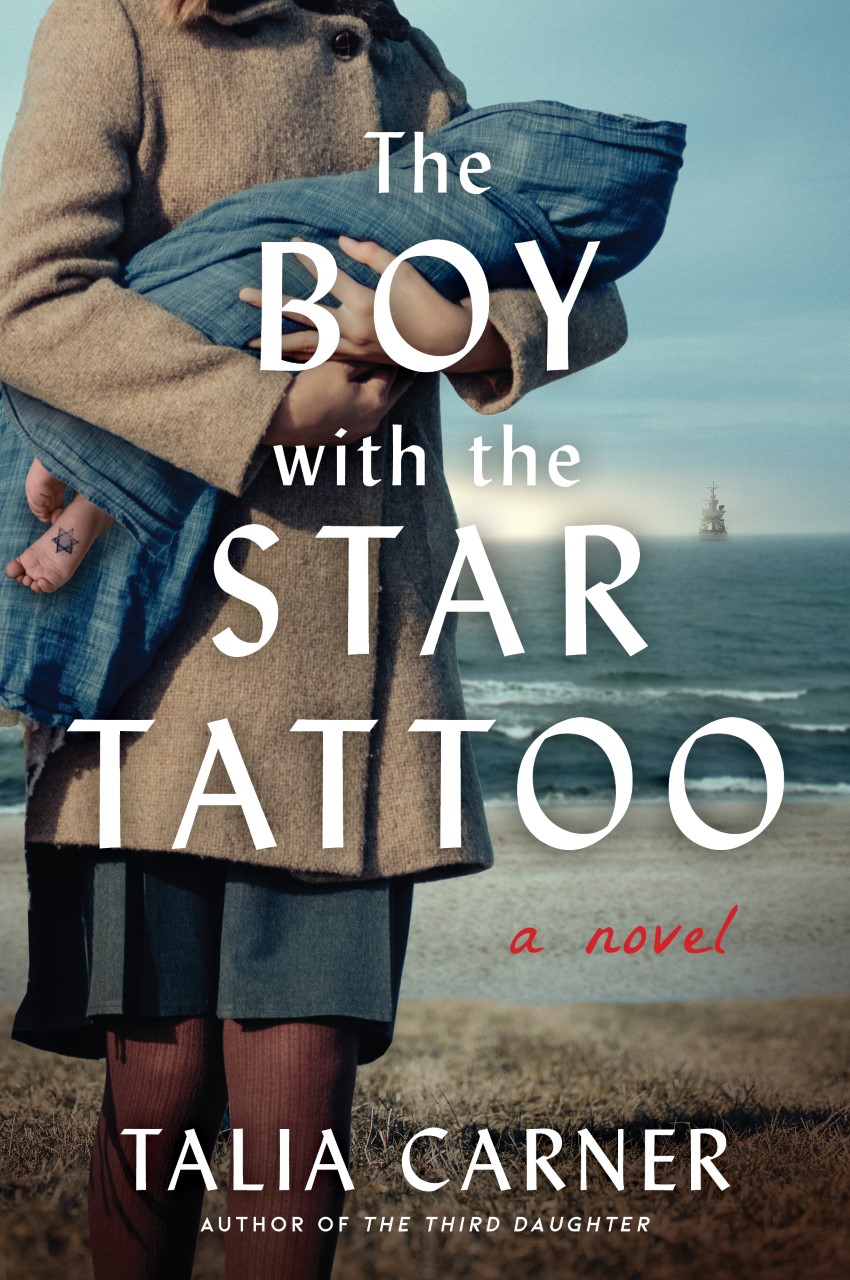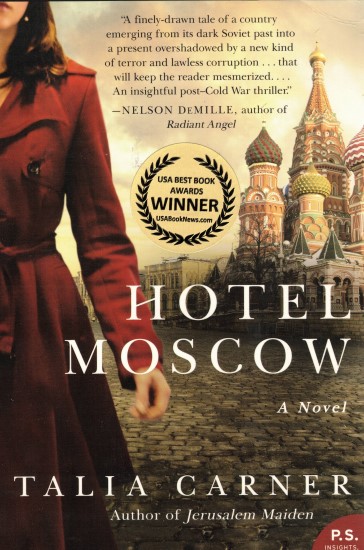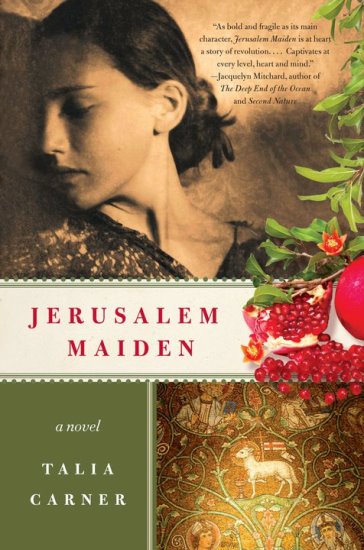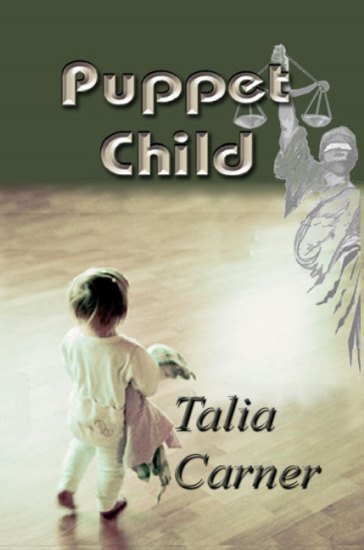in the entire world: Paris, London, Budapest, Boston.
My main office, though, is in Buenos Aires. . . . I have an eye for the goods. One glance and I can tell you how much it’s worth and how far it should move. In my business, though, a sharp eye alone is not enough. One also needs a keen nose, a sniff that will tell you from a mile away what kind of a dog is buried there. . . . What do I deal in? Ha, ha!
Not in Hanukkah candles, my friend, not in Hanukkah candles!
—Sholem Aleichem, “The Man From Buenos Aires,” 1909
Prologue
Russia, 1889
Blood pounded in Batya’s temples with the effort of pushing the cart. On the rutted road, the mud-crusted wooden wheels clanked with each turn, and the axles screeched in protest of the heavy load. The late autumn world was silent, indifferent, the fields drained of color, and Batya breathed in rhythm with the axles: Turn, clank, screech—gasp in. Turn, clank, screech—sigh out.
At her side, her mother struggled to push, and her groans reverberated in Batya’s fourteen-year-old heart. Up front, her father labored to pull the cart, and although the heap of their salvaged belongings blocked Batya’s view of him, she could hear him pant. She was worried that her parents’ exhaustion might doom them to the fate that the bloody pogrom had left unfinished.
At least the barking of the dogs that accompanied their exile from Komarinoe had faded. Batya dared not glance back to see the flames of their burning hut rising like a cry to heaven. She dared not turn her head, as if from this distance she could glimpse her friend Miriam lying in a red pool, defiled.
Yesterday’s rain had turned the ground soft, and a wheel sank in the mud. Batya’s father pulled harder, grunting with the effort. If only they had their horse. As old and emaciated as Isadore was, he had served Batya’s father, Koppel, on his daily rounds, delivering cheese and butter to his customers. But the horse had been commandeered—led away from their yard by the constable—while their Russian neighbors, friends Batya had known all her life, looted their home. They didn’t wait until her family had departed, nor did they offer money to buy the stove, cot, and chicken the family couldn’t take along. They had just carried them out.
The stuck wheel wouldn’t budge. Batya and her mother tucked the hems of their long dresses away from the mud and, leaning forward, pushed with all their might. Twelve-year-old Surale dropped the rope with which she led Aggie the cow to lend the little strength in her thin arms.
The cart wouldn’t budge.
“Remove the heaviest things,” Batya’s mother told her. “The table.” She pointed, and Batya’s heart skipped a beat. No! This was their sturdiest piece of furniture, her mother’s dowry—inherited from Batya’s grandmother —and her source of pride.
The loss pulsating in her heart, Batya climbed on top of the cart and pushed the table off. It tumbled down and crashed, two of its legs flying into a ditch. Batya’s mother bent to stroke the tabletop, now splintered, a top she had wiped and waxed thousands of times until it shone with her love.
Batya readjusted the large tin pot her mother used to churn butter, tied together with the tools for cheese making. These were her family’s livelihood. She resecured them over the bedding, but tossed down the bench, now useless without the table.
“That will do,” her father called out to her. He crouched to slide the broken bench seat under the wheel to create a ramp. With the next push, the cart lurched forward, freed.
As they continued on the road, pulling and pushing the cart, Batya’s head became light from the exertion. Perspiration cooled her face, but left it itchy, attracting flies. Her knitted socks chafed. Blisters burned. Hours from now, when she would finally take off her wooden clogs, she would find gaping holes in the bottom of the socks.
At last, they stopped to rest at the side of the road. The chill of the day confirmed the approaching winter. How long could her family continue like this, Batya wondered, and where were they to go if the entire region was being cleared of its Jews? If only her two older sisters hadn’t dispersed to their lives—each joining a man with whom she had fallen in love, flouting their father’s traditional role in finding them a match. They had broken his heart, and now, with Surale still so young, Batya was left to worry about their parents alone.
Her father turned his head upward to God. “When a man becomes his own horse, does a horse turn into his own master?”
“Where are we going?” Surale asked the question Batya dared not bring up.
“To America, of course,” he responded with exuberance in his voice.
“Isn’t it too far to walk from Russia?” Batya asked. In her mind’s eye she tried to visualize the world map Fishke had shown her before he ran off with her sister Keyla. Fishke, a wandering scholar her father had picked up on his travels to tutor his daughters, had planned to start the revolution but ended up in a Siberian gulag as a guest of the czar. Keyla had written that she hired herself as a farm laborer near her husband’s prison, hoping to visit him once a month. “America is even farther away than Siberia,” Batya added.
“Just a locomotive ride to Odessa, then a ship across God’s vast ocean,” her father replied.
A locomotive! Batya had heard of this steam-spouting dragon that roared over metal tracks. Railroads dug through mountains and soared high on bridges, never to be swallowed whole in the belly of the rock nor to fall into the abyss of deep valleys. She rose on her toes and looked over the field into a distant, blurred line of a white birch forest, searching for tracks. Once they happened on them, would she just wave to the locomotive the way one would to a passing wagon? Would the iron beast stop in its rush and let them all climb in?
The idea of being carried away from here lifted Batya’s spirits, but her mother grumbled to her husband her usual practical considerations.
“You tell me who has the money for that locomotive, let alone for a ship’s passage?” she asked. “A passport alone costs fifteen rubles for each person. When was the last time you saw sixty rubles in one pile?”
“The Master of the Universe—not you—decides who gets to go to America.”
“So the Master of the Universe buys you tickets with no rubles?”
Batya looked around her at the wilderness, at the cart heaped with whatever had been left of their lives. She wanted so much to believe in her father’s dream, or she’d fall into despair.
Part I
I am unwelcome, and my body is burning with the shame of not belonging.”
―Warsan Shire
Chapter One
Her family had been on the road for two days when a kind innkeeper who had been Koppel’s customer allowed them to settle on the hay in his barn. He brought over a pot of steaming soup rich with vegetables and three-day-old bread.
Hunger and fatigue had knitted into Batya’s body. Her feet throbbed from the days-long flight. Her blisters oozed, and she couldn’t wait to release her feet from the clogs. Her stomach rumbled.
“Wait,” her father said, as the four of them sat down around the bowl set on the ground. He dipped his fingers into a bucket of water and mumbled the blessing for the food so fast that his words jumbled.
The soup smelled delicious, and Batya had already torn a piece of bread and dipped it, when her mother, her hungry eyes on the food, said, “It’s not kosher.”
Not kosher. Batya’s hand hung in midair, the aroma filling her mouth with saliva.
Her father winked at her. “It is said in the Good Book, ‘All that are hungry should come and feast.’”
“It’s in the Passover Haggadah’s tradition about inviting strangers into our home for the meal,” Batya replied. It had nothing to do with breaking the kashrut prohibition that required adherence to strict Jewish ritual in the slaughtering of animals and food preparation. Smiling at her father’s permission, she put the bread in her mouth, then dipped a spoon in the bowl. Surale followed.
Straightening, Batya noticed that her parents still sat back on their haunches. She took in her mother’s pale face, and a wave of protectiveness washed over her. “Pikuach nefesh,” she said, referring to the principle that the preservation of human life overrode any other commandments, even the laws of kashrut.
“Another Talmudic maven in the family,” her mother replied. Nevertheless, to Batya’s satisfaction, she dipped her spoon in the bowl.
As the flavor filled Batya’s mouth, her relief was instantly dampened by the vision of Miriam lying spread-eagle, covered in blood. The screams Batya had heard coming from her friend’s house while hiding with Surale in a nearby tree resounded in her ears. She shook her head to make them disappear. She mustn’t weaken her spirit with the horrific sights and sounds of the past.
Her father was unloading the bundle of beddings. Batya rose to help, and as soon as she stretched them on the hay, her mother lowered herself to lie down. A cry of pain escaped her lips.
Surale dropped down next to her. “Mama! Mama, what’s the matter?”
“She needs to rest,” Batya said. The fear and worry that had accompanied her for days returned to fill her lungs. Make Mama healthy and strong, she prayed. She found a pail inside the barn door and rushed to the well by the trough. Hanging with all her weight on the handle of the pump, she managed to bring up water, then carried the heavy pail inside the barn. She ladled water with their tin cup and, propping her mother’s shoulders, brought it to her mother’s lips.
“Sleep now,” Batya told her after a few sips, gently lowering her mother’s head.
“Hear, O Israel, Adonai, our God, Adonai, is one,” her mother recited the Shema prayer before bed, then opened her eyes. “Remember, Batya. No matter where you are, say your prayer. It will protect you from demons that come during the night searching for innocent souls.”
Hadn’t the demons arrived in the form of the uniformed Russian soldiers and the muzhiks, the wild peasants, who came looting, burning, and killing? Batya silenced the memory of the constable’s mocking voice when he had darkened their door and told Koppel that because he was “a good Jew” his family would be spared death if they left.
She soaked the family’s single towel in water, then wiped her mother’s face, examining the wrinkles that framed her eyes and mouth. Her mother had married young. At thirty-eight now, she was already a grandmother to Hedi’s baby, although she would never meet that child. Two years earlier, scandalizing the family, Hedi had eloped with a goy. With his love stretched past the breaking point, their father had declared Hedi dead and forbidden the rest of the family ever to see her or to speak of her. But how could Batya erase that sight, when, on the dawn of their escape, she saw her beloved Hedi—very much alive—standing behind the fence of their burning hut? Through the haze of smoke and trembling hot air, her sister’s silhouette seemed ethereal as expected from a betraying daughter-declared-ghost. Their mother reached out her arms from the distance, as if to hug her supposedly dead child.
“Ignore the ghost,” Batya’s father ordered, then raised the shafts of their cart and began marching. Only Batya saw the tears streaming down his cheeks and disappearing in his beard, which, overnight, had turned gray. Batya had wanted to wave back to her sister, but had been afraid of the calamitous consequences of returning a gesture from a ghost.
Batya was exhausted. In the only light of dusk streaming from the cracks in the barn walls, she collapsed on the bedding next to her mother.
“You’re a good daughter,” her mother murmured. “The light of my days.”
Batya’s eyelids were just closing when the innkeeper returned.
Batya’s father rose to meet him. “God will reward you for your kindness.”
The man collected his pot. “Until He does , maybe your wife can come to the kitchen to clean up? The inn is full of guests, and my wife is complaining—”
Although they spoke Russian, Batya understood enough. “I’ll go,” she said quickly to her father in Yiddish. “Let Mama rest.”
“Maybe my two daughters help instead? As the Good Book says, ‘Two are better than one.’”
The innkeeper’s glance hovered over Surale’s small frame, curled into a ball. “Maybe she can scrub the floors later, when we close for the night.”
The evening stretched long in the hot kitchen. Batya helped the cook chop onion, boil sausages, and fill up bowls of food that were almost too heavy for her to carry, but whose aroma made her mouth water all over again. She had never known fatigue like this; it settled in every joint and muscle in her body and made her eyelids drop even as she forced them open. When she was sent to the cellar to bring up coal, she sat down and fell asleep for what seemed like a few seconds, until she was jolted awake by the cook’s angry cry. “Where is that Jewess girl?”
Hoisting the sack of coal on her back, Batya lumbered upstairs. She unloaded it by the oven and saw that the coal had added to the sorry state of her filthy blouse and faded pinafore.
“What a lazy girl you’ve sent me,” the cook complained to the innkeeper’s wife.
Batya vowed not to sit down again even if she fell right into the fire of the open oven. She must continue to work hard so the innkeeper would allow her family to stay in the barn one more day, then maybe another, until her mother regained her strength and they could continue walking to the train that would take them away from this misery.
The moon had traveled to the other end of the canopied sky when Batya finally stumbled back to the barn, ready to fall onto the hay. She didn’t stop to let her eyes adjust to the dark and collided with a horse at the spot where her family had previously been. She stood still for a moment until she could make out a second horse and a large unhitched covered carriage that had been rolled in front of her family’s two-wheeled cart.
“Up here,” her father called to her in a loud whisper. “The ladder is to your right.”
Her eyes adjusting to the darkness, Batya climbed up to the hayloft. “Wake up Surale to go wash the floors,” she murmured as she fell asleep at her father’s feet.
No time must have passed before she felt a small tug on her foot. “The cook is calling you to help with breakfast,” Surale said.
Batya swam up from the depth of her sleep, groaned, and glanced at her sleeping parents. Her mother’s breathing was calm, and her father was snoring. “Will you milk Aggie?” she asked her sister.
She had no idea what to do with all the milk. Her mother was too weak to put in the hours of whipping milk into cream or churning it into butter, and they couldn’t hang their gauze cloths for the days it took soured milk to turn into cheese. Nevertheless, Aggie must be milked or the pressure would build up, she’d get sick, and her milk would stop.
Batya lit a candle and fixed it on a tin plate so she could see when ladling out some of yesterday’s milk, its freshness preserved by the cold weather. She scooped the cream that had formed on top, placed it on a piece of leftover bread, peeled off a layer of onion, and gobbled it all down.
As she hurried back to the kitchen in the dark, she prayed, “Thank You, God, for watching after my family—” She stopped. God wasn’t here, where His Jews were being tortured and exiled, if not murdered. Maybe He was in the Holy Land—but more likely He was in America, where everyone prospered and ate chicken every day.
Only after the midday meal did the innkeeper’s wife let Batya rest. She gave her a bowl of potatoes and sauerkraut with tiny pieces of sausage peeking out to take to her family, and then draped a dress set over Batya’s arm.
“Here. Tidy up so you can help serve dinner in the tavern.”
Batya’s heart sang as she rushed back to the barn. Serving dinner would be cleaner and less exhausting than hauling coal. She was being elevated ! She halted outside the barn and fished out with her fingers the pieces of sausage, surely made of pork and horsemeat, and hurled them toward the dogs tied near the shed. In her head, she asked God for forgiveness. The unkosher meat, tref, had contaminated the entire dish, but even He would have agreed that it was more important that her parents ate.
With a moan, her mother rose on one elbow from the hay. She reported that Koppel was out, trying to sell whatever milk and dairy products he could carry on his back. Earlier he had split wood for the innkeeper and tended to the guests’ horses.
“I’m sorry to be a burden when we need all our strength,” her mother added, then whispered, her voice breaking. “If only Hedi had married the postman, she’d be alive and we would all be riding to America in his fancy coach with bells.”
“Just rest, Mama.”
“Why did Keyla have to run off to Siberia? When will I ever see her again?”
You have me. I’ll make up for all the disappointments.
Batya fell into a deep sleep, but a dream of Komarinoe and Miriam’s murder woke her up with a start, horror contracting her heart. She missed her dark-eyed, laughing, inventive friend. Just last month, the two families had shared the festive Rosh Hashanah dinner, after which their fathers sang joyous wordless nigunim, “bim-bim-bam,” and “ai-ai-ai.”
She must forget Miriam and Komarinoe. She mustn’t think of her two willful sisters who had dispersed. It fell upon her to be the rock for her parents, work hard, and hope that the innkeeper would allow them to stay until she somehow found a way to help her father get them to America.
Batya filled the pail of water at the well and then hid behind a heap of hay at the back of the barn while she washed herself with a rag as best as she could. Feeling clean made up for the freezing water that prickled her skin. Right after the full moon, she would have to take care of her monthly flow. It had started five months before, and she’d learned to wash and hang the rags to dry. How could she do that when her family was out on the open road again, pushing their cart? She shoved away the apprehension. Tonight she had work to do, honest work that would guarantee her family’s safety here from road bandits and from the snow flurries that now swirled in the air before early sunset.
Surale combed the hay out of Batya’s hair and plaited it into twin braids, then wrapped them around Batya’s head like a crown, using a dab of butter to flatten the stubborn tendrils into submission. There was nothing they could do to stop the itching of lice or remove the white eggs visible down the strands of Batya’s blond hair. The lice would continue to multiply along with the fleas in their bedding.
Batya hadn’t worn a good dress since she’d outgrown her Shabbat sarafan, the long, printed pinafore worn over a blouse, an ensemble that had first served her two older sisters. When passed to Surale, the shirt had been patched too often, and the dress’s printed flowers had faded and looked no better than the tattered ensemble passed down to Batya from her mother. It felt so good now to put on the fresh white blouse and slip on the brown pinafore.
Tying the strings of the high-waisted, striped apron behind Batya’s back, Surale gushed over its hem and collar trimmed in red and green.
Batya whirled to feel the ample fabric of the skirt rise and fall against her ankles. She laughed, grabbed both of Surale’s hands, and pulled her into a spin, round and round. It seemed so long ago when they had last romped in joy, when only poverty was their steady companion, not fear and loss and the uncertainty of the coming days.
“How will we find a good shidach if there’s no matchmaker around?” Surale asked.
“You’re crazy to think of such a thing at your age!” Laughing, Batya hid her embarrassment that this past year some new longing had awoken in her, too.
“I hope my groom will be handsome and interesting and well-off,” Surale said. “Like Hedi’s—”
“Hedi?” Batya stopped dancing. “She betrayed us—and all our people. She permitted the Jew-hating priest to marry her!” Batya squeezed Surale’s hands until her sister winced. “The most important mitzvah you and I can ever do is honoring our parents. Be loyal and obedient. Two daughters have already disobeyed them. We’re never to do that, too. Do you understand?”
“Sorry,” Surale mumbled.
Batya softened. “We’re too poor and have no remarkable lineage to appeal to a good match. But even without yichus, when the time comes, Papa will find each of us a good man.”
“Mama says that Papa is a dreamer.”
“He’s survived many pogroms. He speaks directly to God and can read the Bible. Didn’t the neighbors come to him to read their letters for them? Papa knows what’s good for us.” Batya looked at her feet. “For now, all I want is a new pair of socks.” Buried in the cart was a stained child’s sweater her mother had bought from a peddler with the intention of unraveling the wool to reuse. Batya had no time now to dig under the heap of the family’s possessions for the yarn and the knitting needles.
Ten minutes later, she stopped at the tavern door and examined her reflection in the window. The uneven pane of glass distorted it, but not enough to hide the green of her large eyes and the pink of her too-full lips.
“I’ll be worthy of Your name,” she whispered. Her name, Batya, meant God’s daughter, and as such she was destined for great things. Her first mission was to help her family survive.
Her hand on the door handle, a new understanding washed over her of an internal shift: since their escape, her parents could no longer protect and provide for her. She had grown up.
# # #
